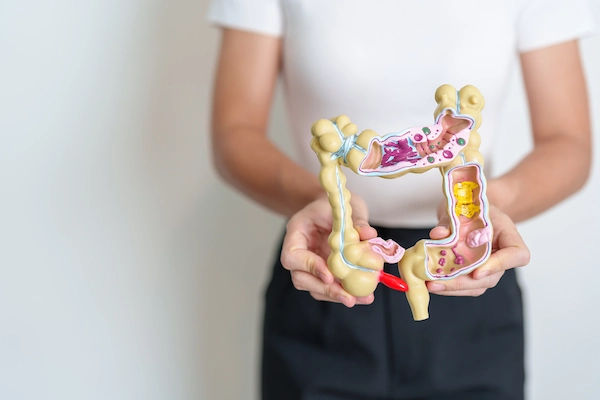Guide to Why Ibs Go Undiagnosed
Discover why Irritable Bowel Syndrome (IBS) often goes undiagnosed, the challenges in diagnosis, and how to advocate for yourself to find clarity and relief.


Introduction
Irritable Bowel Syndrome (IBS) affects millions, yet a significant number suffer in silence without a formal diagnosis. The journey to putting a name to chronic bloating, abdominal pain, and erratic bowel habits is often long and frustrating. If you've been navigating unexplained digestive distress without answers, you're not alone. The very nature of IBS and the limitations of modern medicine mean it frequently goes undiagnosed for years. This guide delves into the complex reasons behind this medical puzzle, from the lack of a simple test to the stigma that prevents open conversation. We'll explore the challenges, empower you with knowledge, and outline the steps you can take to finally find clarity and relief for your digestive symptoms.
What is Irritable Bowel Syndrome (IBS)? Understanding the Condition
Irritable Bowel Syndrome is a common functional disorder of the digestive system. The key word is "functional," meaning there's no observable structural damage or disease—like ulcers or inflammation—that tests can easily pinpoint. Instead, it's a problem with how the gut functions. The communication between the brain and the gut is disrupted, leading to the bowel becoming overly sensitive. The muscles in the gut may contract too forcefully, causing diarrhoea, or too slowly, leading to constipation. This is why it's often called a disorder of the gut-brain axis.
The Primary Symptoms of IBS
The symptoms of IBS are chronic and recurring, typically present for at least one day per week in the last three months. They include:
- Abdominal pain or cramping, usually relieved by a bowel movement.
- Bloating and a sensation of excess gas.
- Dramatic changes in bowel habits: diarrhoea (IBS-D), constipation (IBS-C), or a mix of both (IBS-M).
IBS Subtypes: Not a One-Size-Fits-All Condition
Understanding that IBS presents differently is crucial to understanding why it's missed by doctors. A patient with
primarily constipation may be treated for just that, while one with diarrhoea might be misdiagnosed with a food allergy, preventing a unified IBS diagnosis.
The Top Reasons Why IBS is Frequently Undiagnosed
1. The Diagnostic Challenge: No Single Definitive Test
This is the single biggest factor. Unlike diabetes (blood sugar test) or anaemia (blood count), there is no scan, blood test, or scope that can confirm IBS. Diagnosis is primarily a process of exclusion. Doctors must first rule out more serious conditions with similar symptoms, such as inflammatory bowel disease (IBD), coeliac disease, or even colon cancer. This process can be lengthy, expensive, and emotionally draining, leading some patients to abandon the pursuit of a diagnosis altogether.
The Role of the Rome IV Criteria
In the absence of a lab test, gastroenterologists rely on the Rome IV Criteria—a set of symptom-based guidelines. A diagnosis is often made if a patient has had recurrent abdominal pain for at least one day per week in the last three months, associated with two or more of the following: related to defecation, associated with a change in frequency of stool, or associated with a change in form (appearance) of stool. This subjective nature can lead to variability in diagnosis.
2. Symptom Overlap with Other Gastrointestinal Disorders
The symptoms of IBS are notoriously non-specific, mirroring those of many other conditions. This overlap is a major hurdle.
IBS vs. IBD: A Critical Distinction
While their names and some symptoms (diarrhoea, pain) are similar, Inflammatory Bowel Disease (Crohn's disease,
ulcerative colitis) involves visible inflammation and damage to the digestive tract, which can be seen during a
colonoscopy. IBS does not cause this damage. A less-experienced clinician might not order the necessary scopes to make this distinction.
Consult a Specialist for Personalised Advice
Confusion with Coeliac Disease and Food Intolerances
Coeliac disease involves an immune reaction to gluten that damages the small intestine, detectable by blood tests and biopsy. Non-coeliac gluten sensitivity and other food intolerances (e.g., lactose intolerance) cause IBS-like symptoms but are different entities. Untangling this web requires specific testing that may not be initially considered.
3. Patient Reluctance and Embarrassment
Digestive health is still shrouded in taboo. Many people feel too embarrassed to discuss details about their bowel
movements, gas, or bloating with their doctor. They may downplay their symptoms or use vague terms like "stomach upset," which doesn't convey the severity or chronic nature of the problem. This prevents the doctor from getting the full picture necessary to suspect IBS.
4. Symptom Fluctuation and the "Good Day" Problem
IBS is often characterised by flare-ups and periods of remission. A patient might have severe symptoms for a week and then feel relatively normal for the next two. They may postpone a doctor's appointment, and by the time they see a physician, their symptoms are mild. It's hard to convey the severity of a bad flare-up during a good phase, leading a doctor to underestimate the impact on the patient's quality of life.
5. Lack of Awareness and Training Among Some Physicians
While gastroenterologists are experts in this area, the first point of contact is usually a primary care physician. A busy GP, faced with a patient describing common digestive complaints, might quickly attribute it to "something they ate" or stress without diving deeper into the pattern and duration that would point to IBS. Ongoing education about functional gastrointestinal disorders is essential to improve this.
The Emotional and Physical Toll of an Undiagnosed Condition
Living with undiagnosed chronic pain and unpredictable bowel symptoms is profoundly isolating. Without a name for their condition, patients may blame themselves, thinking their diet is hopelessly flawed or that they are "going crazy." The constant anxiety about when the next flare-up will hit can lead to social withdrawal, avoidance of restaurants or travel, and increased stress—which itself exacerbates IBS symptoms, creating a vicious cycle. The lack of validation from a medical professional can be as damaging as the physical symptoms.
How to Advocate for Yourself and Seek a Diagnosis
Taking control of the process is your most powerful tool.
Preparing for Your Doctor's Appointment
- Keep a Symptom Diary: For 2–3 weeks before your appointment, track everything: food, drink, stress levels, bowel movement frequency/consistency (using the Bristol Stool Chart), pain location and severity, and bloating. This data is gold for your doctor.
- Write Down Your Questions: Don't rely on memory. Ask directly: "Could this be IBS?" or "What conditions do we
need to rule out?" - Be Bluntly Honest: Overcome the embarrassment. Doctors have heard it all. Use clear terms like "diarrhoea,"
"constipation," "mucus in stool," and "painful gas."
What to Expect During the Diagnostic Process
Your doctor will likely start with a thorough history and physical exam. Based on your symptoms and risk factors, they may order blood tests (to check for anaemia, coeliac disease, inflammation markers), stool tests (to rule out infection or inflammation), and possibly a colonoscopy, especially if you are over 45 or have "red flag" symptoms like bleeding or weight loss. If all these tests return normal, and your symptoms fit the Rome Criteria, a diagnosis of IBS can be made. If your symptoms persist beyond two weeks, consult a doctor online with Apollo24|7 for further evaluation and to discuss these initial steps.
Conclusion
The path to an IBS diagnosis is often non-linear, fraught with uncertainty and frustration. Understanding the core reasons—from the lack of a definitive biomarker to the societal hesitancy to discuss bowel health—can empower you to become a proactive participant in your healthcare journey. Remember, your symptoms are real, valid, and deserving of attention. While the process requires patience, achieving a diagnosis is the critical first step towards effective management and significantly improving your quality of life. You can move from simply coping to actively thriving by working with a knowledgeable healthcare professional to develop a personalised management plan that may include dietary changes, stress management, and medication. If your condition does not improve after trying these methods, book a physical visit to a doctor with Apollo24|7 to get a comprehensive evaluation and find a path to relief.
Consult a Specialist for Personalised Advice
Consult a Specialist for Personalised Advice

Dr. Anand Ravi
General Physician
2 Years • MBBS
Bengaluru
PRESTIGE SHANTHINIKETAN - SOCIETY CLINIC, Bengaluru

Dr. Vivek D
General Physician
4 Years • MBBS
Bengaluru
PRESTIGE SHANTHINIKETAN - SOCIETY CLINIC, Bengaluru

Dr Syed Mateen Pasha
General Physician
2 Years • MBBS
Bengaluru
PRESTIGE SHANTHINIKETAN - SOCIETY CLINIC, Bengaluru

Dr. Syed Ismail Ali
General Practitioner
7 Years • MBBS
Hyderabad
Apollo 24|7 Clinic, Hyderabad

Dr. Debajyoti Goswami
Obstetrician and Gynaecologist
10 Years • MBBS,D.G.O(DNB),Adv. Infertility Tech.(AIIMS),Fellowship in Diabetes(U.K),Comprehensive Abortion Care(Govt. Of W.B), Certificate in Clinical Embryology(AIIMS, BHUBANESWAR)
Bankura
D.G Clinic, Bankura
(25+ Patients)
Consult a Specialist for Personalised Advice

Dr. Anand Ravi
General Physician
2 Years • MBBS
Bengaluru
PRESTIGE SHANTHINIKETAN - SOCIETY CLINIC, Bengaluru

Dr. Vivek D
General Physician
4 Years • MBBS
Bengaluru
PRESTIGE SHANTHINIKETAN - SOCIETY CLINIC, Bengaluru

Dr Syed Mateen Pasha
General Physician
2 Years • MBBS
Bengaluru
PRESTIGE SHANTHINIKETAN - SOCIETY CLINIC, Bengaluru

Dr. Syed Ismail Ali
General Practitioner
7 Years • MBBS
Hyderabad
Apollo 24|7 Clinic, Hyderabad

Dr. Debajyoti Goswami
Obstetrician and Gynaecologist
10 Years • MBBS,D.G.O(DNB),Adv. Infertility Tech.(AIIMS),Fellowship in Diabetes(U.K),Comprehensive Abortion Care(Govt. Of W.B), Certificate in Clinical Embryology(AIIMS, BHUBANESWAR)
Bankura
D.G Clinic, Bankura
(25+ Patients)
More articles from Irritable Bowel Syndrome
Frequently Asked Questions
Can you have IBS for years and not know?
Absolutely. Many people attribute their symptoms to a 'sensitive stomach,' poor diet, or stress for years without realising their pattern of bloating, pain, and altered bowel habits fits a specific clinical diagnosis like IBS.
What can be mistaken for IBS?
Several conditions are commonly mistaken for IBS, including Inflammatory Bowel Disease (IBD), coeliac disease, lactose intolerance, small intestinal bacterial overgrowth (SIBO), endometriosis (in women), and even certain thyroid disorders.
What are the red flag symptoms that suggest it's NOT IBS?
'Red flags' that require immediate medical investigation include unexplained weight loss, rectal bleeding, waking up at night with diarrhoea or pain, fever, persistent vomiting, or a family history of ovarian cancer, colon cancer, or IBD. These symptoms are not typical of IBS alone.
How long does it typically take to get an IBS diagnosis?
There's no set timeline. It can take months or even years, depending on the severity of symptoms, how quickly other conditions are ruled out, and how effectively the patient communicates their experience to their doctor.
Is it worth getting an official IBS diagnosis?
Yes. While there is no cure, a diagnosis provides validation, rules out more serious diseases, and opens the door to targeted treatments and management strategies that can drastically reduce symptoms and improve your daily life.




